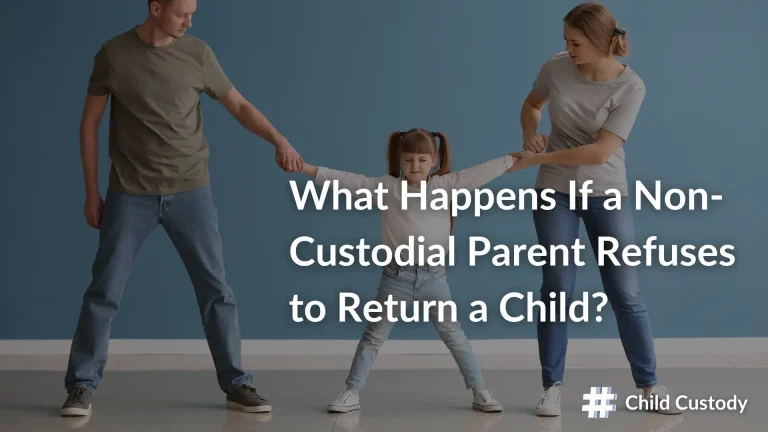In custody arrangements, non-custodial parents usually retain visitation rights to spend time with the child in pre-arranged, closed-ended periods. However, non-custodial parents might not always honor these arrangements, which naturally leads to the question: What happens if a non-custodial parent refuses to return a child after a visitation?
Texas’ Parental Kidnapping Laws
In Texas, refusing to return a child after a visitation is a type of parental abduction. According to Texas Penal Code Section 25.03, a non-custodial parent commits a crime when they retain a child if retaining them breaks the terms of a court-ordered visitation agreement.
Depending on the circumstances, violating a court-ordered custody arrangement can be a felony and carry a significant criminal penalty. The non-custodial parent may also suffer curtailment of future parental rights. After a severe violation, the court might eliminate the non-custodial parent’s visitation rights entirely.
What Should I Do If a Non-Custodial Parent Refuses to Return the Child?
The first thing you should do is talk to the non-custodial parent and see if you can avoid expensive and time-consuming litigation over the issue. You may be able to solve some conflicts without having to involve the court. Here are some options if you’re wondering what happens if a non-custodial parent refuses to return a child.
Petition for Writ of Habeas Corpus
If you cannot find a peaceful resolution, you can file a petition for a writ of habeas corpus. A writ of habeas corpus will require the non-custodial parent to appear in court with the child and explain their reasons for retaining them. If the judge finds that the non-custodial parent is in violation of the court-ordered arrangement, they can enforce the order. Anyone with a valid court order showing their custody of a child can file a writ of habeas corpus.
Writ of Attachment
If you believe your child is in immediate danger, the court can order a writ of attachment. With a writ of attachment, the police can take physical custody of your child to return them to you. Courts typically issue a writ of attachment if there is a high chance the non-custodial parent will ignore a writ of habeas corpus or flee with possession of the child.
Preparing for a Child Custody Court Hearing
You will typically have to attend a hearing after you file for a court order requesting the child’s return. During the hearing, each side will present arguments and evidence that they have the superior right to possession of the child. Below are some tips to help you prepare for this kind of hearing:
- Talk to an attorney as soon as possible. A family law attorney can provide general legal advice and ensure you have the proper documentation and evidence for your custody and visitation dispute hearing.
- Collect relevant documentation about your case. This includes the original custody agreement, communications with the other parent, and the child’s school/medical records.
- Gather a list of witnesses. Witnesses can corroborate your claims and evidence during the hearing.
- Remain calm and composed. Losing your temper during a court hearing can negatively affect your capacity as a parent and the hearing outcome.
What If the Non-Custodial Parent Takes My Child to Another Country?
A parent taking a child across national borders is complicated due to jurisdictional and enforcement issues. However, there are still options available. If the non-custodial parent takes the child internationally and violates their custody order, you can take the following actions:
- Contact law enforcement immediately. You should also contact the US embassy in the country where the non-custodial parent took the child.
- If you suspect the parent may be flying internationally, contact the relevant airport about a potential abduction.
- Obtain documents concerning your relationship with the child (i.e., birth certificate, custody agreement, etc.).
- Talk to an attorney about your situation. They can help you find international legal assistance. You may also want to contact an attorney in the foreign country.
- Certain countries will work with the US to help resolve international parental kidnapping cases. You may be able to get help from the foreign nation’s court system.
- Organizations such as The Office of Children’s Issues work with international and foreign agencies to combat international parental abduction cases.
Divorce and Child Custody Attorney in The Woodlands
Divorce and custodial issues are legally complex and emotionally sensitive, so it’s in your interest to work with an experienced and knowledgeable The Woodlands family law attorney. Contact BB Law Group PLLC online or call (832) 534-2589 today to receive a confidential case evaluation!
Related Posts:
How to Get an Emergency Custody Order Tips
Do Grandparents Have Visitation Rights in Texas?
Restraining Order Function in Texas
Do You Pay Taxes on Alimony in Woodlands, Texas?
Can You Write Off Child Support in Woodlands, Texas?
How Relocation Affects Child Custody Agreements in The Woodlands


